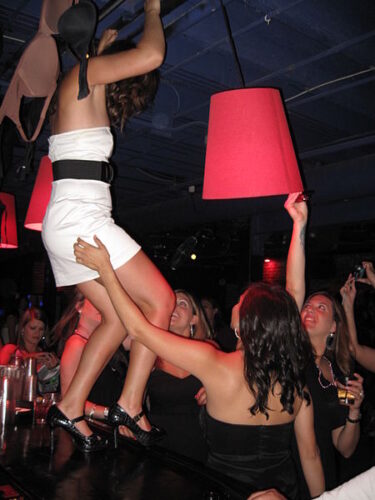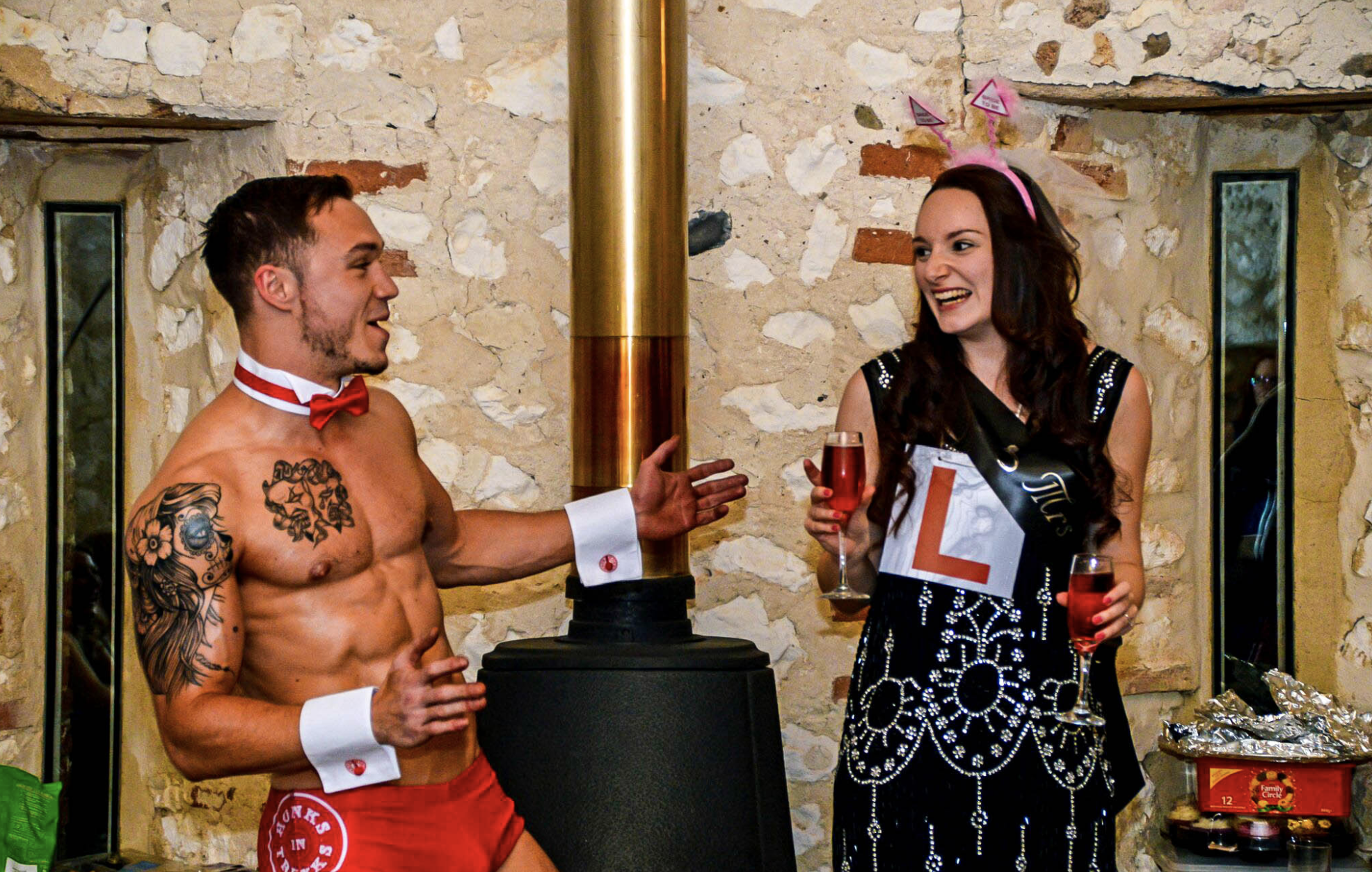Editor’s Note: Taking a page from David Foster Wallace’s “Consider the Lobster,” writers in Kelley Crawford’s Alternative Journalism class at Tulane University chose objects that are rather ubiquitous. Then, they dove into the symbolic narrative those objects tell. Up first in the “Consider the _____” series is the bucket.

Bachelorette Party (Photo by Nora Daniel)
Flying to New Orleans, Louisiana for the weekend, you and your closest friends are giddy with excitement to celebrate your best friend’s Bachelorette party. You guys have been counting down the days for months now in your group chat named “Out to play before we give her away.” It’s her “last chance” of freedom — one more time to go wild, one more time to embrace the unmarried life, one more time to have a crazy night out with her girlfriends. Where else besides the one and only Bourbon Street? Booze, beads, and boys … what could be better?
You have a detailed itinerary planned for the girls this week. First, hand grenades. Second, bar crawl. Third, strip clubs. While seemingly normal when we think of a bachelorette party, would this sort of celebration be happening if we were born hundreds of years ago? The answer is no. Before you begin your weekend festivities, let’s remember how these wild weekends came to be what they are today. Although they may not look like it, bachelorette parties are a sexual and independent revolution for women because these parties were once available to men.
5th Century B.C. – The concept of bachelor/bachelorette parties can be traced back to ancient Greece. Ancient Spartans celebrated the groom-to-be’s last night as a free man, but they weren’t known as “bachelor parties” just yet. This event consisted of toasts at a massive feast for the groom to pledge his loyalty to his brothers followed by a trip to the theater. No women were allowed here, because how dare a woman disrupt the bromance between a groom and his brothers?
15th Century – The term “bachelor” is first referenced in Geoffrey Chaucer’s “Canterbury Tales” to describe a “lusty,” unmarried man. The term expands to a young knight or a student with a bachelor’s degree. Then, it is used to describe an unmarried man. But in all instances, it references a man coming to full fruition: a squire before becoming a knight, an undergraduate before becoming a graduate, a single young buck before a committed married man. During this time, women weren’t even allowed to get an education, become knights, or choose their own spouse. Their rights included learning basic knowledge, owning property, divorcing their husbands if beaten and few others. How could women be included in these rights of passage without really having many rights?
19th Century – The “stag night” was invented, which is what we now know as a bachelor party. It focused on commiseration over the end of a man’s sexual freedom, and typically consisted of copious amounts of alcohol, pranks, and girls. But this notion that men are “giving up” something by getting married, that they are deserving of one last night of debauchery, implies that women are taking something from men by being in love. Why do men “deserve one last night of debauchery,” but women do not? What, do they think that all women are as evil and crazy as Medusa once you marry them?
1896 – Herbert Barnum Seeley, grandson of Phineas Barnum (circus entrepreneur), sets out to throw his brother, Clinton Barnum Seeley, the greatest bachelor party ever, which would soon be known as the “Seeley Bachelor Party Orgy”. This would consist of a 17-course dinner, music, dancing, and more. The event is raided by the New York Police Department around 1:30am and Herbert faces charges. Because of crime? No. Because of drugs? No. Why? Because a famous belly dancer was set to perform “indecent dances” in the nude for party guests. Seems crazy considering the events that take place at a Bachelor party today, right? But, of course, a nude woman would be the center of trouble. We continue to see this demonization today in the raids of New Orleans strip clubs and the lack of legalization of sex work. Our legal system wouldn’t dare let a woman fully embrace her sexual identity or dance with her clothes off. Women actually have to fight just for sex work to be decriminalized and for it to be considered real work.

Women protesting the decriminalization of sex work.
1930s – Pre-wedding rituals for women consisted of a classy bridal shower for the bride to express her excitement and anticipation. They were very different from the days leading up to the wedding for the men. Women would receive housewares, cookbooks, lingerie and other items that would enable them to care for their husbands and homes, reinforcing the ideology that women belong in the home or private sector. Hats reading “Same Penis Forever”? Male strippers disguised in costume? Whipped cream shots? Not a chance.
1960s – The women’s rights movement, also known as the women’s liberation movement, fought for equal rights and opportunities and greater personal freedom for women. This is part of the “second wave” of feminism and focused on multiple aspects of women’s experience — including politics, work, the family, and sexuality.
Women earned the right to their very own “hen night”, which is what we now know as bachelorette parties. Instead of bridal showers, brides-to-be were counting down the days to their wedding with a rowdy night with their girls. This is a huge breakthrough for the women’s movement as women are finally not being held to prim and proper standards. Don’t be fooled: us girls can keep up with the chaos of a guy’s night.

A bride’s bachelorette party consisted of a butler dressed in trunks.
1980s-1990s – The bachelorette party becomes a widely accepted pre-marital tradition. The term “bachelorette party” is seen in print in 1981 in a New York Times article. Women’s sexual identity was not always recognized publicly, but the women’s sexual revolution ignited change, and the bachelorette party broke that barrier and made this taboo aspect a seemingly normal ritual. It signified sexual freedom, which was another step toward gender equality.
January 2020 – 78 percent of women who got married reported having a bachelorette party in the last year. It is now accepted and normalized. So, you and your best group of girls have the freedom to celebrate however you choose. Classy bridal showers where you receive cookbooks are exchanged for penis paraphernalia.
Now, you’ve landed in The Big Easy. You get off the plane, you grab your beads, your hand grenade, and your matching shirts. You throw the penis straws in your purse for later. You stop at the ATM to stock up on single dollar bills. You remember that women did not always have this freedom, but we’ve come a long way. Thus, you proudly embrace the craziness that lies ahead, knowing that you finally have the freedom to embrace your sexuality the same way that your groom does.
Watch out, Bourbon Street! The girls are ready for a crazy weekend.
 NOLAbeings Multimedia artist Claire Bangser created NOLAbeings as a portrait-based story project that marries...
NOLAbeings Multimedia artist Claire Bangser created NOLAbeings as a portrait-based story project that marries...  Voodoo in New Orleans: Reviving history: New Orleans fortune telling This article takes a deep dive into the history of Voodoo in New Orleans, its hybridization with Catholicism, and its present-day place in the city's culture. The author visits fortune-tellers in the French Quarter, using their guidance as a tool for introspection rather than a deterministic predictor of the future. Through her experiences in New Orleans, the author feels a mystical connection to both the past and the future.
Voodoo in New Orleans: Reviving history: New Orleans fortune telling This article takes a deep dive into the history of Voodoo in New Orleans, its hybridization with Catholicism, and its present-day place in the city's culture. The author visits fortune-tellers in the French Quarter, using their guidance as a tool for introspection rather than a deterministic predictor of the future. Through her experiences in New Orleans, the author feels a mystical connection to both the past and the future. 